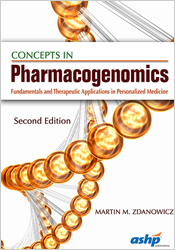
In order to help minimize spread of the coronavirus and protect our campus community, Cowles Library is adjusting our services, hours, and building access. Read more...
 Concepts in Pharmacogenomics by
Concepts in Pharmacogenomics by  Pharmacogenomics: foundations, competencies, and the pharmacists' patient care process by
Pharmacogenomics: foundations, competencies, and the pharmacists' patient care process by National Resources
Databases
Journals